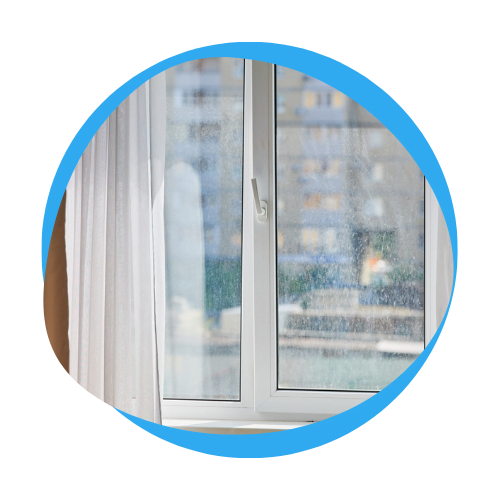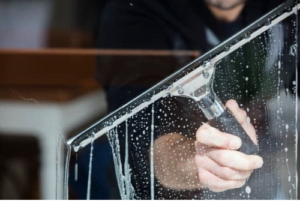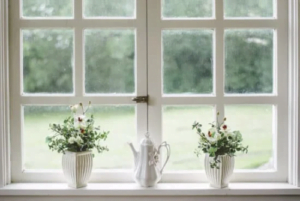Have you ever been frustrated when window cleaning, seeing a mark, trying to clean it, and are left questioning “are my windows dirty or damaged?”. Some homeowners can drive themselves crazy trying to clean a mark on their window, be it small or large, with no success. Window cleaning seems straightforward, right? What could go wrong? While cleaning windows might seem like a simple task, it actually requires a certain level of skill and expertise. Without the proper knowledge, attempting to clean windows can actually do more harm than good. If the homeowner confuses dirt with damage and proceed to clean the damage then this can lead to greater window impairments. So before you embark on the task of window cleaning, it’s essential to understand the difference between dirty windows and damaged windows. In this post, we’ll delve into the nuances of window cleaning and provide you with valuable insights to ensure that your windows stay clean and functional.
The Importance of Regular Window Cleaning
Clean windows can significantly enhance the overall look and feel of your home. Aesthetically, dull, dirty or streaky windows can detract from the beauty of your property, making it appear unkempt and uninviting. Conversely, clean windows make a house look brighter, more welcoming, and aesthetically pleasing. Clean windows can also improve the indoor air quality of your home by allowing natural light to come in and brighten up the space. This can boost your mood, increase productivity, and even promote better sleep. Don’t underestimate the power of natural lighting and windows on your mental health, see this recent study that finds evidence to support this! This is particularly important for properties that have poor natural lighting. Additionally, regular window cleaning can help maintain the structural integrity of your windows, preventing dust and debris from building up and causing damage. So, whether you’re looking to impress your guests, boost your curb appeal, or simply enjoy a more pleasant living environment, keeping your windows clean with regular upkeep is an essential aspect of maintaining a comfortable and visually appealing home.
Now that we understand the importance of clean windows, how to determine if your window is dirty or damaged?

Dirty Windows
It is a regular issue to have dirty windows which can be fixed with a deep window cleaning service and can be unkept with regular window cleaning maintenance. Having dirty windows compared to damaged windows is a much easier problem to deal with. The most apparent sign of dirty windows is streaks, smudges, and grime on the glass. Dirt on windows can happen due to several reasons, such as:
- Weather Conditions: Extreme weather conditions such as rain, snow, or wind can cause dirt and debris to accumulate on the windows. This problem is extremely common in countries such as Ireland, which is why our Dublin window cleaning rounds is extremely popular. Also, if you are interested in regular window cleaning in Ireland, we also cover Wicklow, Meath, Kildare and some parts of Louth!
- Improper Cleaning: Improper window cleaning can actually lead to even dirtier windows. When windows are not cleaned properly, dirt and grime can be spread around rather than removed. For example, using a dirty or damp cloth to wipe down your windows can actually leave behind more dirt and streaks than before. Additionally, using the wrong cleaning products or techniques can damage your windows, making them more susceptible to attracting dirt and grime. For instance, using harsh chemicals or abrasive scrubbers can scratch the surface of your windows, creating a rough surface that dirt and dust can easily cling to. Furthermore, using unpurified water when cleaning windows can leave behind streaks and water spots, making your windows appear even dirtier than before. Therefore, it’s important to use the proper cleaning tools and techniques when cleaning your windows to ensure that they are left clean and free of streaks and smudges. This is how professional window cleaners clean windows.
- Neglect: Neglecting window cleaning can lead to a build-up of dirt, dust, and other debris that can accumulate over time. This build-up not only detracts from the appearance of your windows, but it can also increase the risk of future damage. Dirt and grime can eat away at the surface of your windows, causing scratches and other damage that can compromise the integrity of the glass. Over time, this damage can lead to cracks, chips, or even shattered windows. Additionally, the build-up of dirt and debris on your windows can obstruct natural light, making your home feel dark and gloomy. Furthermore, neglecting window cleaning can also result in the growth of mould or mildew, which can cause health problems and lead to even more damage to your windows. Therefore, it’s important to regularly clean your windows to prevent the build-up of dirt and debris, and to ensure that your windows remain in good condition for years to come.
If you suspect that your windows are dirty and can’t get your windows cleaned professionally, you can try cleaning them with a solution of water and mild dish soap. Use a clean, soft cloth or a squeegee to wipe away the dirt and grime. Avoid using harsh chemicals or abrasive materials as they can scratch the glass. As mentioned, cleaning your windows yourself with non-purified water can leave streaks and unfavourable marks on your windows. Be sure to use a squeegee and remove any water from the surface of the windows. Now that we know what dirty windows are and the causes behind the dirt, let’s discuss damaged windows.
Damaged Windows:
Dirty windows can be cleaned and, depending on your cleaning approach, can be left as good as new. Damaged windows, on the other hand, are a more serious problem that requires immediate attention. Some signs of damaged windows include:
- Cracks or Chips: If you notice cracks or chips on the glass, it is a clear indication that your windows are damaged. It can sometimes be difficult to tell whether a window is cracked or simply marked with dirt. Here are a few ways to help you determine the difference:
- Look closely at the mark or blemish on the window. If it appears to be on the surface of the glass and can be wiped away with a cloth, it is likely just dirt or grime.
- If the mark or blemish appears to be a physical break in the glass, such as a crack or chip, it is likely damage to the window.
- Try tapping on the glass gently with your fingernail or a pen. If the sound is dull or thudding, it could indicate that the glass is cracked. If the sound is clear and sharp, it is likely just dirt or smudges.
- Check for any signs of moisture or condensation between the panes of glass. If there is moisture present, it could be a sign that the seal between the panes has been compromised and the window needs to be replaced.
- If you are unsure about whether the mark on your window is dirt or damage, it’s always best to seek the advice of a professional window cleaner or repair person who can assess the situation and provide guidance on the best course of action.
- Foggy Glass: If you notice foggy or cloudy spots on the glass, it could be a sign of a broken seal, which can cause moisture to accumulate between the panes. It can be difficult to tell whether foggy glass is due to damage or just dirt, but here are a few ways to help you determine the difference:
- Check the location of the foggy glass. If the fog is located between the panes of a double-paned window, it is likely a sign of seal failure and not just dirt on the surface.
- Look closely at the foggy glass. If you see streaks or drips on the inside of the window, it could be a sign of condensation caused by seal failure. If the fog appears to be on the surface of the glass and can be wiped away with a cloth, it is likely just dirt or grime.
- Touch the glass. If it feels damp or wet to the touch, it is likely due to condensation caused by seal failure. If it feels dry and only slightly dirty, it could be just dirt.
- If you are still unsure about whether the foggy glass is due to damage or dirt, it’s always best to seek the advice of a professional window cleaner or repair person, who can assess the situation and provide guidance on the best course of action.
In summary, if you notice foggy glass between the panes of your window, it is likely due to seal failure and not just dirt. However, if the fog appears to be on the surface of the glass and can be wiped away easily, it is likely just dirt. If in doubt, it’s always best to consult a professional.
- Drafts: If you feel drafts coming in through the windows, it could be due to gaps or cracks in the frames, which can affect energy efficiency. Unlike other forms of window damage, drafts are difficult to determine because the are not visible. If you feel a draft in your home, it can be difficult to determine if it’s coming from a damaged window or somewhere else. Here are a few ways to help you determine if the draft is coming from a damaged window:
- Check for visible damage: Take a close look at your windows to see if there are any visible signs of damage such as cracks, chips, or gaps between the window frame and the wall. If you find any of these, it could be a sign that your window is damaged and needs to be repaired or replaced.
- Use a candle or incense stick: Hold a lit candle or incense stick near the window and watch for any movement in the flame or smoke. If the flame or smoke moves, it could be a sign that there is a draft coming in through the window.
- Conduct a paper test: Hold a piece of paper near the window frame and see if it moves or flutters. If it does, it could be a sign that there is a draft coming in through the window.
- Check the weatherstripping: Check the weatherstripping around the window to make sure it is intact and not worn or damaged. If the weatherstripping is not working properly, it could be allowing air to flow in through the window.
- Seek professional help: If you are still unsure whether the draft is coming from a damaged window or not, it’s always best to seek the advice of a professional window repair person, who can assess the situation and provide guidance on the best course of action.
In summary, if you notice visible damage, movement in the flame or smoke of a candle or incense stick, or movement of a piece of paper near the window frame, it could be a sign that your window is damaged and needs to be repaired or replaced.
If you suspect that your windows are damaged, it is essential to get them fixed or replaced as soon as possible. Damaged windows can compromise the safety and security of your home and also affect energy efficiency, leading to higher utility bills.

Conclusion
In conclusion, if you are unsure whether your windows are dirty or damaged, take a closer look at them. If you see streaks or smudges, then your windows are probably just dirty. However, if you notice cracks, chips, or foggy glass, it is best to contact a professional to assess the damage and recommend the best course of action. Remember that taking care of your windows is essential to maintain the overall safety, comfort, and appearance of your home. The long-term impacts of damaged windows can lead to increase costs, time-wasting and a devaluation of the property. Regular window cleaning can massively reduce the risk of window damage. Get in touch today to discuss your regular window cleaning options!


